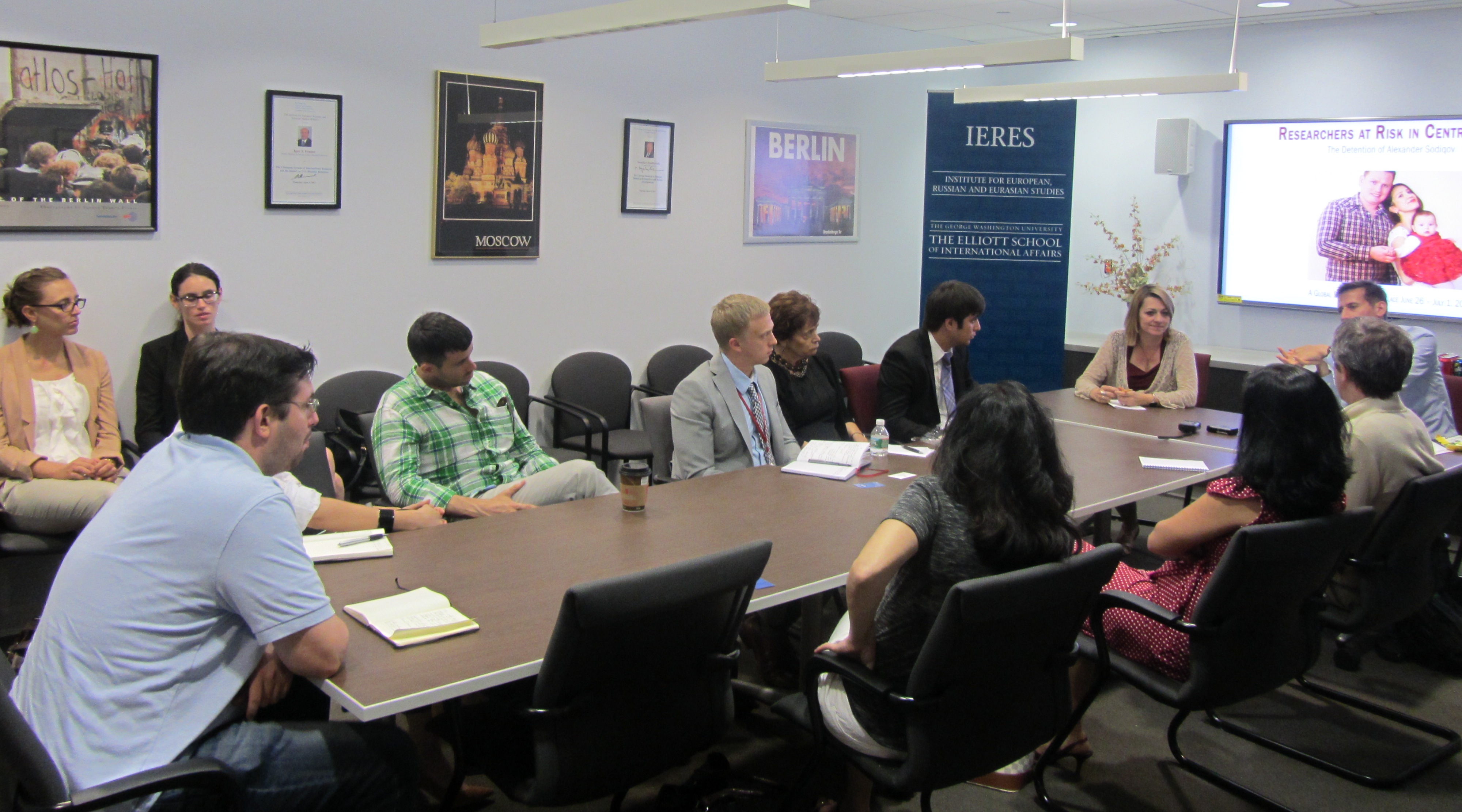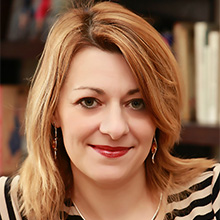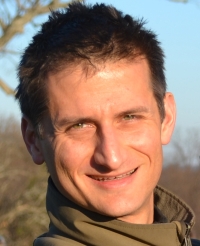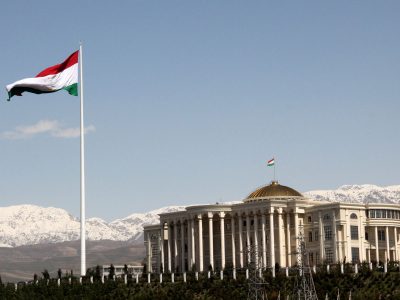
Scholars meet to discuss Alexander Sodiqov's detention at the George Washinton University. The event was hosted by the George Elliot School of International Affairs (Photo by GWU)
This post is part of our campaign #FreeAlexSodiqov: GV Author Detained in Tajikistan.
Alexander Sodiqov, an academic and Global Voices community member, was wrongfully arrested whilst conducting research in Tajikistan on June 16. Although a PhD student at the University of Toronto at the time of his arrest, Alexander was working for the University of Exeter (U.K.) on an Economic and Social Research Council project focusing on ‘Rising Powers and Conflict Management’.
In response to his arrest, the academic community organised a global campaign for his release. This includes a petition (with almost 3,000 signatures as of June 28), and a series of academic events around the world to discuss the case. Events were held in Canberra, Exeter, Toronto, Paris, Freiburg, Astana, Bishkek, London and Heidelberg. A meeting of solidarity for Alexander was also held by the Ankara Segmenler Forumu, a Turkish civil society group.
Washington-based academics also hosted an event. Around 30 academics met at the George Washington University in Washington D.C. on June 27 to discuss Sodiqov's case. The discussion centered on the details of his arrest, the context within which a researcher could be accused of “spying” and the implications for research in Central Asia. Thanks to Voice of America's Uzbek service, there is also full audio of speeches made by the event's two main speakers, Marlene Laruelle and Eric McGlinchey, embedded at the bottom of this article. The quotes below are abridged from that audio.
As with the other events connected to Alexander Sodiqov, the meeting was titled ‘Researchers at Risk in Central Asia: The Detention of Alexander Sodiqov’.
Dr Marlene Laruelle. Photo taken from elliott.gwu.edu.
Dr. Marlene Laruelle of the Elliot School of International Affairs at George Washington University: I wanted to say one important thing in particular: The Central Eurasian Studies Field is now very much developed as a field of study thanks to a network of young scholars coming from Central Asia and working in North America and Europe. They are the living part of the future of Central Asian studies globally. If the future of Central Asian studies is to have a large number of scholars that are passport holders from the region, and if those scholars are put at risk for doing their job it will drastically change the way we get information from the region and the way we train our scholars.
This is part of a global context. In June this year Russia passed a law criminalizing non-declaration of U.S. citizenship among Russian passport holders. This is creating a general atmosphere in Russia and elsewhere in the region.There is this now this narrative of expatriates being part of a fifth column. Alexander was able to be arrested because he is a Tajik citizen, albeit working in Toronto and carrying out research in Tajikistan on a British grant. This is a legal gap the Tajik government is using to have a negative impact on the knowledge we are getting out of Central Asia. Now in the future, we have to be really concerned about sending researchers from Central Asia to do research there because we may be putting them at risk.
Dr Eric McGlinchey. Photo taken from mason.gmu.edu
Dr. Eric McGlinchey of George Mason University: I think the Tajik government has made an honest mistake. Firstly Alexander is not a spy. John Heathershaw, the Principle Investigator on the project Alexander was working on has been nothing but transparent in conveying the nature of the project to the Tajik government. He has released all the documents related to the project both to the Tajik press and the international community. There is no question of what Alexander was doing in Khorog. John and I had a lunch in Bishkek [Kyrgyzstan] a week before Alexander was detained with various Kyrgyz and international colleagues and John was telling us all about the research. If one were engaging in espionage activities, it would be very strange if one were to telegraph those activities in front of an international audience. Nothing is being hidden here.As I have said, I think this is an honest mistake on the part of the Tajik government. How could such an honest mistake occur? I think it is the classic mistake of confusing causation and correlation. Some bad things happened in GBAO [the anonymous region of Tajikistan where Sodiqov was arrested] not long before Alexander arrived. Some bad things happened in GBAO two years before Alexander arrived. Some bad things happened in the Rasht Valley [also eastern Tajikistan] four years before Alexander arrived. So there are a lot of things happening in Tajikistan that from the point of view of the Tajik government, are very unsettling. The Tajik state has a lot to worry about in this region and the Tajik state is on edge. This is the classic kind of situation where people can make honest mistakes. So what I think happened here, is that a very savvy, charismatic, talented Tajik researcher, who happens to speak fluent English, came to Khorog to do research, and this was unusual. And unusual things gather attention. And as a result, the situation we see unfolded – the Tajik government came away with a mistaken interpretation of what he has been doing. This is not something the U.S. government is unfamiliar with. For the last couple of years I have been working on a case related to Ravil Mingaza, who is currently in Guantanamo. I am completely convinced Mingaza is in Guantanamo because the U.S. government has arrived at a mistaken interpretation of what he has been doing. So, the Tajik government can make mistakes, the U.S. government can make mistakes and I am actually paradoxically optimistic about this situation, because I think it is an opportunity for the Tajik government to show that due process works in Tajikistan. You can have a fair investigation, which will reveal what we already know to be true – that Alexander isn't a spy – and he will be released in due course. By doing this the Tajik government will demonstrate, both to civil society and the international community that its system works.
You can also listen to their conversation here:
To find out how you can help visit our campaign #FreeAlexSodiqov: GV Author Detained in Tajikistan.
Podcast: Play in new window | Download





